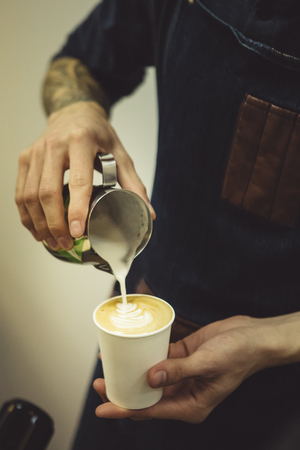Introduction: The Journey of Your Daily Brew
Picture this: it’s a crisp morning in London, your favourite mug in hand, and the comforting aroma of freshly brewed coffee fills your kitchen. But as you take that first sip, have you ever wondered just how far those coffee beans have travelled to reach you? Enter the concept of ‘coffee miles’—a term echoing around eco-conscious circles from Brighton to Edinburgh. Coffee miles refer to the distance your coffee has journeyed from farm to cup, encompassing every step along the global supply chain. For many Brits, mindful of their carbon footprint and eager to make sustainable choices, understanding coffee miles is more than a passing curiosity; it’s a call to action. Each mile clocked up by your daily brew represents energy consumed, emissions released, and resources spent before it lands in your local café or supermarket shelf. In a nation where sustainability is gaining ground with every reusable cup spotted on the commute, paying attention to the story behind our morning ritual matters now more than ever.
2. Coffee Culture in the UK: From High Streets to Hipster Cafés
In the UK, coffee is far more than a morning pick-me-up; it’s an ever-present thread woven through the cityscape, from bustling high streets to hidden, ivy-clad corners where indie cafés thrive. The British coffee culture stands at a crossroads of tradition and innovation—where you can just as easily find a flat white served with artisan flair as you can enjoy a classic filter brew in a centuries-old tearoom repurposed for modern tastes.
This unique blend of heritage and hipster coolness shapes how Brits experience their daily brew. On one hand, there’s the familiar comfort of large chains dotting town centres, providing consistency and convenience. On the other, an explosion of independent cafés has swept across neighbourhoods, each with its own story, local suppliers, and experimental spirit. This new wave celebrates provenance, inviting customers to savour beans roasted just down the road and pastries baked that morning by someone who knows your name.
The evolution of coffee haunts in Britain mirrors shifting attitudes towards sustainability and community. Local cafés have become champions for reducing coffee miles—minimising the distance beans travel from roaster to cup—by collaborating with UK-based roasters and supporting homegrown suppliers. This shift isn’t merely about flavour; it’s about forging connections between people, place, and planet.
Let’s take a closer look at how tradition meets trend on the UK’s café scene:
| Café Type | Signature Experience | Sourcing Approach |
|---|---|---|
| High Street Chains | Consistent menu classics Convenient locations |
Global supply networks Centralised roasting |
| Independent Cafés | Artisan coffee Bespoke atmosphere |
Local roasters Direct trade emphasis |
| Pop-Up & Market Stalls | Experimental drinks Seasonal collaborations |
Hyper-local suppliers Small-batch roasting |
This tapestry of coffee culture means that every cup poured tells a story—not just of taste, but also of place. Whether you’re wandering through Manchester’s Northern Quarter or tucked away in a Brighton laneway, supporting local cafés helps reduce coffee miles while nurturing an environment where creativity flourishes and communities gather.
![]()
3. Understanding Coffee Miles: What’s the Fuss?
Let’s peel back the label and get to grips with what “coffee miles” actually mean in the UK context. Coffee miles refer to the total distance those humble beans travel from their origin – often far-flung places like Ethiopia, Colombia, or Vietnam – all the way to your local high street café or kitchen counter. It’s a journey that spans continents, crosses oceans, and racks up a sizeable carbon footprint along the way. For many Brits who take pride in their morning brew, it’s easy to overlook this invisible voyage tucked behind every cup.
The fuss isn’t just about numbers on a map; it’s about the environmental toll embedded in each mile. Transporting green coffee beans typically involves massive container ships, lorries, and sometimes even air freight for specialty batches – all of which burn fossil fuels and release greenhouse gases. The further your beans travel, the more emissions they contribute to our already beleaguered atmosphere.
But there’s more than just CO₂ at stake. The complex logistics chain required to get those beans from farm to filter means additional packaging, storage, and handling – each step layering on its own environmental cost. For a country like the UK, keenly aware of its global climate commitments and passionate about sustainable living, understanding coffee miles is no longer niche eco-chatter but part of a bigger conversation about how our daily rituals shape the world around us.
4. Why Local Matters: Supporting British Roasters and Community
If you take a stroll through any UK high street these days, from Shoreditch to Sheffield, it’s hard not to notice the blossoming of independent coffee roasters. This isn’t just a trend—it’s a movement, one that speaks to the heart of local culture and environmental responsibility. But why does buying from British roasters matter so much in the context of reducing coffee miles?
Firstly, by supporting homegrown coffee businesses, we’re choosing more than just a great flat white; we’re investing in our own communities. The rise of UK-based roasters means more jobs created locally, greater opportunities for skill development, and an ever-thriving café culture that gives each neighbourhood its own unique flavour.
Here’s how supporting British coffee roasters stacks up against importing beans roasted overseas:
| UK-Based Roaster | Imported Roasted Coffee | |
|---|---|---|
| Coffee Miles | Lower – beans travel only once (to the UK) | Higher – beans travel twice (to roaster, then to UK) |
| Community Impact | Supports local jobs and skills | Profits often leave the local area |
| Freshness & Flavour | Beans roasted closer to consumption date | Potentially less fresh on arrival |
| Environmental Footprint | Reduced emissions from transportation | Larger carbon footprint due to double shipping |
This emerging scene isn’t just about sustainability or economics—it’s about identity too. Each micro-roastery brings its own story, blending tradition with innovation and giving back to the places that nurture them. Choosing local means choosing to belong—to be part of a city’s rhythm and a community’s future.
5. Environmental Benefits: Less Travel, More Green
Choosing locally roasted and sourced coffee beans in the UK is more than just a nod to neighbourhood pride—it’s a tangible step towards a greener future. When your morning flat white begins its journey just down the road instead of halfway across the globe, the environmental savings start to stack up like a good crema.
Reducing Transport Emissions
The most obvious win comes from slashing “coffee miles”—the distance coffee travels from farm to cup. Every mile shaved off means less fuel burned and fewer emissions clouding our skies. In the UK, local roasters often work directly with ethical importers or even British growers (hello, Cornwall’s pioneering coffee farms), ensuring that green beans don’t rack up unnecessary air or road miles before being roasted locally. The result? A cuppa that treads far lighter on the planet.
Cutting Down on Packaging Waste
Local buying habits also mean less packaging waste. International shipments often demand layers upon layers of plastic, cardboard, and insulation to survive their long journeys. Local roasters, by contrast, can offer refills, use recyclable or compostable materials, and sometimes even deliver beans loose for you to scoop into your own jar—a small but stylish rebellion against excess waste.
Lower Energy Usage at Every Step
It’s not just about how far your beans travel; it’s also about how they’re handled along the way. Local roasting operations tend to be smaller and more nimble than industrial giants, using energy-efficient equipment and sourcing renewable power where possible. Plus, shorter supply chains mean fewer refrigerated warehouses and storage depots—all of which guzzle energy. In essence, supporting local coffee doesn’t just keep things fresh; it keeps them green.
By making mindful choices in our daily rituals—like opting for locally roasted beans—we’re not only savouring richer flavours but also nurturing our urban landscapes and rural corners alike. Every low-mileage latte is a quiet act of environmental optimism—a little less traffic on the world’s highways, and a little more green in Britain’s future.
6. Practical Tips: How Brits Can Brew More Sustainably
If you’re a coffee lover keen to cut down your carbon footprint, there are plenty of small but meaningful steps you can take right here in the UK. From sourcing to brewing, making mindful choices doesn’t just help the environment—it also connects you more deeply with your local community and the rich stories behind every cup.
Seek Out Local Roasters
The first step is to look for independent UK-based roasteries that prioritise ethically sourced beans and transparent supply chains. Many British roasters not only work directly with growers but also roast their beans locally, slashing unnecessary transport miles. Pop into your neighbourhood café or farmer’s market—ask about their bean origins and roasting processes. You’ll be surprised how many hidden gems you’ll find right on your doorstep.
Choose Low-Impact Packaging
Opt for coffee sold in recyclable or compostable packaging, or even better, bring your own container for refills if your local shop offers bulk beans. Supporting brands that are ditching plastic for eco-friendlier options is an easy win for both the planet and your pantry aesthetic.
Brew with Consciousness
Sustainability doesn’t stop at the bag. Invest in a reusable filter or a French press to cut down on single-use waste. If you’re partial to milk, consider oat or other plant-based alternatives made by UK producers—they generally require less water and energy than dairy. And don’t forget: only boil as much water as you need, since those extra cups of steam add up over time.
Compost Your Coffee Grounds
Spent coffee grounds are a gardener’s best friend. Sprinkle them around acid-loving plants, add them to your compost heap, or even use them as a gentle abrasive cleaner around the house. It’s a little bit of circular economy, right in your kitchen.
Support Community Initiatives
Many British cities now have zero-waste coffee shops, local refill stations, and community-led sustainability programmes. Get involved! By supporting these ventures—or simply spreading the word—you help build momentum for greener habits across your city or village.
A Sustainable Sip
Every cup brewed thoughtfully is a small act of resistance against wasteful global systems. By making these mindful switches, Brits can enjoy their daily caffeine ritual while nurturing both the planet and local businesses—one sustainable sip at a time.
7. Conclusion: Sipping Towards a Greener Tomorrow
As we cradle our morning cuppas on bustling British streets or in the quiet corners of a local café, it’s easy to forget that each sip tells a larger story—one woven with choices, landscapes, and the footprints we leave behind. By consciously choosing locally roasted coffee, we’re not just indulging in fresher flavours; we’re casting a vote for sustainability, supporting neighbourhood businesses, and gently nudging the UK’s coffee culture towards a more mindful future. The ripple effect of these small acts can be surprisingly profound. Reducing coffee miles means cleaner air, fewer emissions, and stronger communities rooted in shared values. It’s about more than taste—it’s about stewardship, connection, and the hope that our daily rituals can brew something better for both people and planet. So next time you lift your mug, remember: every thoughtful purchase is a step towards a greener tomorrow, where every cup truly counts.


